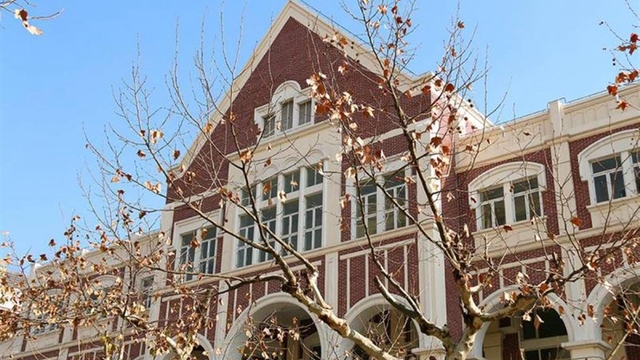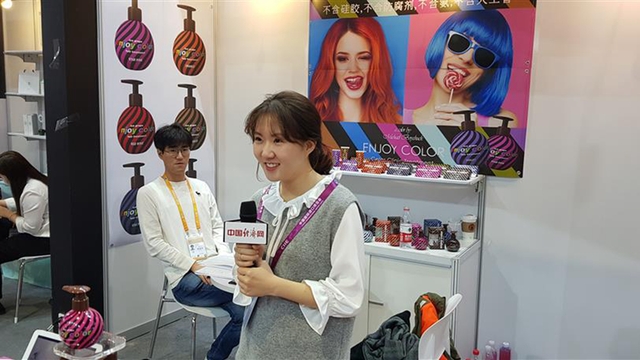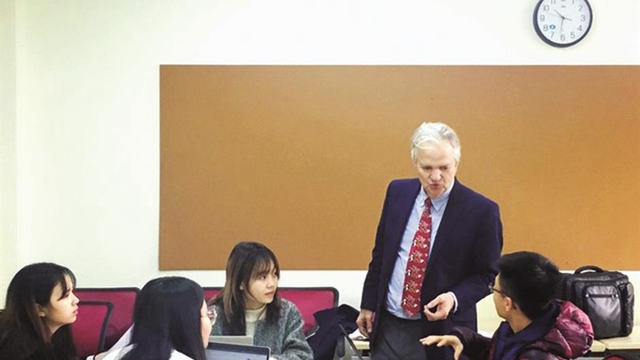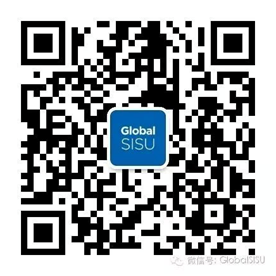
School of English Studies, SISU

Hong Kijung, a SISU student from South Korea, serves as a volunteer at China International Import Expo in Shanghai in November last year.

Curtis Evans, a SISU teacher from the United States, holds group discussions with his students.
The School of English Studies on the Songjiang campus of Shanghai International Studies University (SISU) is housed in a red-and-white brick Victorian-style building. Its interior walls are decorated with quotes from Charles Dickens, Jane Austen and other great writers, and its hallway echoes with the footsteps of students and teachers. It is where Hong Kijung, from South Korea, is studying as an undergraduate and Curtis Evans, from the United States, is teaching as an associate professor.
Hong took Evans’s academic writing class for two semesters and his appreciation of English cinema for another semester. Evans is among her dozens of professors who have helped expand her knowledge and maturity in the past three and a half years.
“Miss Hong struck me as a very adaptable person,” says Evans. “The biggest problem that a student can have, whether a Chinese student or a foreign student, is to have no friends. But if you have a good friend or a network of friends, and of course family support, then you will be fine.”
Hong, from a family of four in Seoul, had two options when she came to China. One was to study Chinese with fellow foreign students at SISU’s Hongkou campus; the other was to study English with Chinese undergraduates at the university’s Songjiang campus.
“I chose the latter and it is a decision that I have never regretted,” she says. “In Shanghai, you can see both urban and rural life; you can have both the Bund and the peaceful Songjiang University Town.”
Closer to Chinese culture
During the past three years and a half not only has Hong learned English and Chinese, she counts Chinese students among her friends. She has integrated herself into Chinese culture much faster than she had thought she would.
“My Korean friends tend to spend more time in dressing themselves up and they seem to know what outfit and make-up suits them best. And overall, they look more fashionable than my Chinese friends. But I guess the reason why they pay more attention to their appearance is that they care much more about what other people think of them. My Chinese friends are more casual in this aspect,” she says.
A fan of sul nal, the Spring Festival in South Korea, Hong likes the Chinese Mid-Autumn Festival when she can taste mooncakes of different flavors. She has joined the university’s martial arts club, whose members won third prize at the 2017 Shanghai Martial Arts League for University Students.
“As a foreign student, being able to speak the local language is really important, because friends are important. If you can speak the local language, you can make friends. If you can make friends, you will feel happy. If you feel happy, you won’t get homesick. If you are not homesick, you can concentrate on your studies. In other words, you will be able to flourish. In the case of Miss Hong, both her spoken Chinese and spoken English are very good. I think SISU suits her well,” Evans says.
University life has also taught Hong to become adaptable in dealing with the vicissitudes of life.
“Before, I would be very stressed if things didn’t happen the way I expected. I was rather strict about living according to the goals I had set. But as I turned 20, I came to know that life can’t always go as I planned. Occasionally, I had to change my plans because sometimes they did not mesh with reality,” she says.
What the young woman has always borne in mind is to become a business person like her father.
“My advice to Miss Hong,” says Evans, “was to keep in mind that what you get from the university — all these facts and figures you learn — has a very short half-life. Four years after graduation, 50 percent of all the data that you learned will be out of date or been forgotten. In eight years, that figure will increase to 75 percent. In 12 years, 87.5 percent will have vanished.
Importance of university life
“So why should people go to university? The number one reason is to learn how to learn. The number two reason is to learn how to solve problems. If you know how to learn you can become a life-long learner and thus keep up with ever-changing information. If you can solve problems, you can prosper in business and get on well in life. Business is basically solving problems for customers,” adds Evans, who was a history major before running his own educational business.
To prepare herself for the world of business, since her senior year Hong has been working as a data analyst intern at Third Bridge, a UK consulting company. “This job helps me to understand a variety of industries much better. Before, I was not aware of different industries’ major players, but now I grasp the basic information of companies all over the world,” she says.
Hong was involved in the recent China International Import Expo, acting as an interpreter for South Korean companies. Evans often emphasizes the need for students to contribute to the community.
“I ask my students to write personal statements in my writing class, discussing their past experiences but also talking about their aspirations. The statements can be used when they are applying for graduate school or when seeking employment. The students usually write well. But they need to realize it’s not all about them. In addition, it’s about how they can make contributions to the university’s academic community and the community at large. For those entering a company, how they can help the company make or save money. Or, for those entering government service or teaching, it is about how to serve their constituents or students,” he says.
The professor, in his 19th year of teaching English at Chinese universities, is happy to see Hong and his other students progress under his guidance.
The former owner-operator of a summer camping business, Evans has found fulfillment in teaching at SISU. He was among the teaching faculty for the university’s summer program designed to introduce Chinese culture to visiting foreign students. Besides writing and cinema appreciation courses, he teaches Chinese-to-English translation courses for sophomore and junior students.
“Professor Evans has a deep passion for Chinese language, culture and history, a passion that has also influenced me,” Hong says.
During a New Year celebration at SISU, Evans read his English translation of the poem “Life in the Countryside, Set to a Qingpingyue Melody” (清平乐 村居) by the Southern Song Dynasty (1127–1279) poet Xin Qiji.
“I chose this poem for a New Year recitation because it is optimistic and positive, whereas most of the classical poems on farmers that I have translated are about hardships and the bitterness of life,” Evans says.
The professor, with his deep understanding of Chinese culture, is particularly interested in pre-modern Chinese history. He studies classical Chinese to help with his research and translation work.
In addition to the pride and affection he feels for his students, Evans is exceptionally proud of his two daughters, one of whom works for the United Nations in a famine relief program for Southern Sudan while the other is a successful veterinarian.



